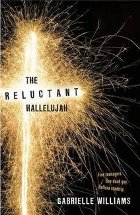The reluctant hallelujah by Gabrielle Williams

Penguin, 2012. ISBN 9780143566847.
(Age: 14+) Highly recommended. Dodie and Coco's parents vanish from
their suburban Melbourne home just as Dodie commences preparations
for both her senior exams and her driver's test. The sisters soon
learn that their grandparents were members of the international
society of Joseph of Arimathea. Under instructions from "the Mover",
the girls aided by Enron, Taxi and the 'hunky' Jones must
"move" an historical artifact to the next safe house. Eluding both
police and the bad guys, an intense road trip to Sydney ensues.
Despite initial misgivings, Dodie becomes a strong leader. Williams'
engaging narrator describes popular culture such as Downtown Abby,
Jamie Oliver and the Brisbane Floods to produce contemporary
suspense with a dollop of speculation. Could the body sent
from Nicaragua decades earlier be that of Eva Peron? Nope, the
basement offered up the perfectly preserved body of . . . The
Messiah himself.
Jose Saramagio's, The Gospel According to Jesus Christ,
retold the story of Jesus with considerable creative license and
alternate factional histories like The Hiram Key or The
Da Vinci Code abound. However, in The Reluctant Hallelujah,
the identity of the villains is not explicitly stated so their
unknown motivations could equally be well intentioned? Nevertheless,
Williams' reluctant protagonists treat Jesus' body with due
reverence throughout the book and considering that there is no such
thing as bad publicity; this part adventure, part history, part
romance and part tragedy is delightful.
So whether you are a Christian or a Possibilitarian (Agnostic) like
David Eagleman, a neuroscientist unable to find explanations in
science for so many natural phenomena, you are bound to identify
with the coincidences (or miracles) that aid these irreverent yet
endearing teens as they become the temporary guardians of Christ's
body. No? In that case the characters and events succeed in
suspending our disbelief as well as any volume of YA Australian
literature.
Potentially controversial, selection is justified by the fact that
it is as well written as it is engaging. On one level mildly
blasphemous but on another, a novel that stimulates that singular
sense of awe and wonder, capable of turning a confirmed Atheist into
a Possibilitarian.
Deborah Robins